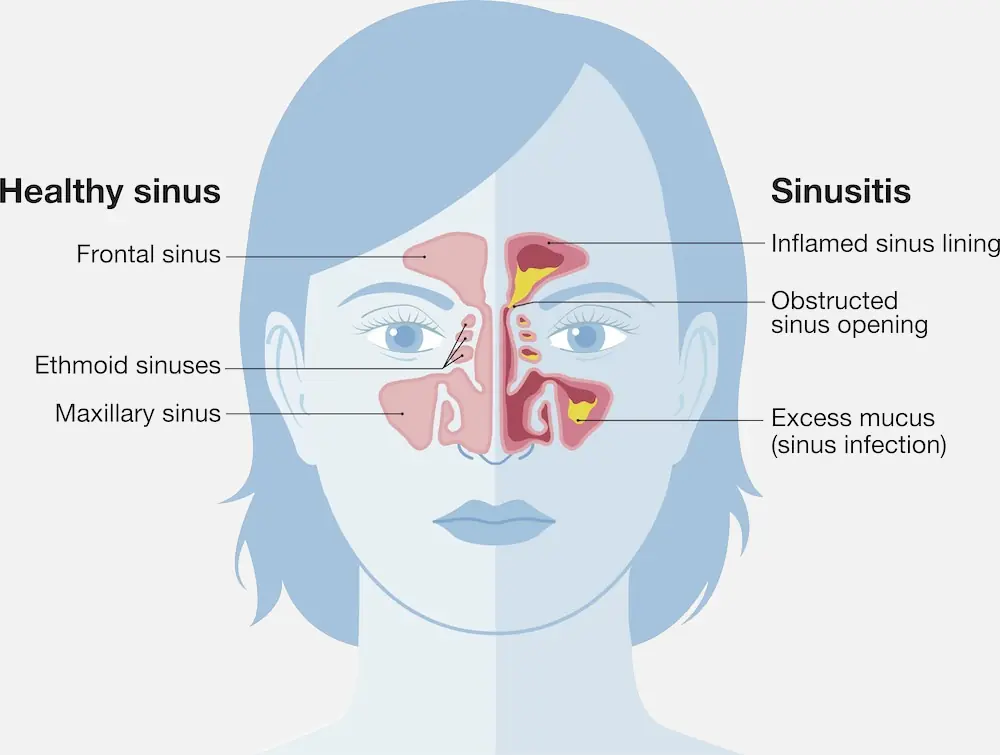Dr. Shawn Allen has either authored or reviewed and approved this content.
Page Updated:Nearly 29 million adults in the U.S. suffer from sinus infections each year. While many cases resolve with at-home remedies, chronic sinus infections and certain sinus conditions often require a board-certified ENT specialist evaluation. Dr. Shawn Allen, a fellowship-trained sinus expert in Houston, offers advanced solutions for patients dealing with persistent sinus symptoms. If you’re struggling with recurring symptoms, you’re not alone. With the right treatment plan, lasting sinus infection relief in Houston is possible.

There are four pairs of air-filled sinus cavities in the head, including the frontal sinuses in the forehead, the ethmoid sinuses between the eyes, the sphenoid sinuses behind the ethmoids, and the maxillary sinuses in your cheeks. They produce a thin layer of mucus that constantly flows out of each sinus and through the nasal cavities to help clear bacteria and debris such as pollen.
Allergies, colds, and other infections can cause the membranes in the sinus to become inflamed, slowing the natural flow of mucus while allowing bacteria and other germs to thrive. Mucous trapped within the sinuses over a longer period thickens and, in severe cases, may calcify, resulting in debris that may only clear with appropriate surgical intervention.

Sinus infections (sinusitis) can range from acute to chronic sinusitis and are especially common among patients with underlying nasal conditions or allergy-related inflammation.
Sinus infection risk factors include:

Sinus infections can feel a lot like a cold at first—but when symptoms linger, worsen, or keep coming back, it may be something more. Chronic sinusitis often presents with a range of frustrating symptoms that interfere with daily life, from constant congestion to facial pain and fatigue. Recognizing the signs early can help you seek the right treatment and avoid ongoing discomfort.
Symptoms of sinusitis may include:
Not all sinus infections are the same. Sinusitis is classified based on how long symptoms last, and understanding which type you have can help guide the right treatment. Whether it’s a short-term flare-up or a long-standing issue, Dr. Allen tailors each care plan to match the severity and cause of your sinus condition.
| Acute Sinusitis | Sub-Acute Sinusitis | Chronic Sinusitis | |
| Duration | Less than 4 weeks | Up to 12 weeks | Longer than 12 weeks |
| Common Symptoms | Sudden onset of congestion, facial pressure, nasal discharge, headache | Lingering symptoms following a cold, often with postnasal drip and fatigue | Ongoing congestion, facial pain, decreased smell, recurring infections |
| Typical Treatment | Decongestants, nasal rinses, OTC meds, possible antibiotics | Prescription nasal sprays, antihistamines, possible short-course antibiotics | In-office procedures, surgery, allergy treatment, long-term medication |

Getting the right treatment starts with an accurate diagnosis. At your consultation, Dr. Allen will review your symptoms, perform a physical exam, and may recommend in-office imaging or specialized testing to better understand the cause and severity of your condition.
Depending on your symptoms, your diagnostic evaluation may include:
With these advanced tools, Dr. Allen can tailor a treatment plan that addresses the root cause of your sinus problems, not just the symptoms.
Most cases of acute sinusitis can be treated at home and resolve within 1 to 2 weeks. Patients usually achieve relief from their sinusitis symptoms by staying hydrated and using:
In cases where sinus infection symptoms last longer than a week, prescription medications may be necessary. Prescriptions to treat sinusitis may include:
For patients whose chronic sinusitis is not responsive to medications, surgery may be performed to improve sinus drainage, clear debris from the sinuses, or address anatomical defects such as nasal polyps (benign growths) or a deviated septum. Dr. Allen’s expertise in minimally invasive sinus surgery offers patients in Houston relief with faster recovery and less downtime.

When chronic sinus issues don’t respond to medication or conservative care, surgery may be the key to lasting relief. Dr. Allen specializes in advanced, minimally invasive procedures that restore proper drainage, improve airflow, and help prevent future infections, personalizing each procedure to fit your anatomy and long-term goals.
This minimally invasive procedure is performed entirely through the nostrils, with no external incisions needed. Dr. Allen carefully enlarges the sinus openings, clears any obstructions or polyps, and improves access for ongoing medication delivery, making it ideal for patients with chronic or recurrent sinusitis.
Learn More About Endoscopic Sinus Surgery
Balloon sinuplasty is a gentle procedure that uses a small catheter to widen blocked sinus passages. It can quickly relieve pressure, improve breathing, and restore sinus drainage with minimal recovery time.
Learn More About Balloon Sinuplasty
If a deviated septum is contributing to your sinus infections or breathing difficulties, a septoplasty may be recommended. This procedure straightens the nasal septum to improve airflow, reduce blockage, and restore natural drainage patterns within the nose.
Enlarged turbinates can block airflow and contribute to congestion, especially in patients with allergies or chronic sinus inflammation. Turbinate reduction helps open the nasal passages, improve breathing comfort, and reduce reliance on decongestants over time.
Colds and sinus infections often feel similar at first but follow different patterns. A cold usually starts with mild symptoms that peak quickly and then fade within a week. If your symptoms linger, get worse after initial improvement, or come with facial pressure, discolored nasal drainage, or a dull sense of smell, it may be a sinus infection.
Key differences to watch for:
Still unsure? Dr. Allen can perform an in-office evaluation to confirm the cause of your symptoms and recommend the right treatment.
Most short-term sinus infections resolve on their own. But if your symptoms last more than 10 days, improve and then worsen again, or include facial pressure, congestion, or a reduced sense of smell that doesn’t go away, it’s time to see a specialist.
You should also contact a sinus expert if:
If you develop a high fever, vision changes, eye swelling, a stiff neck, or confusion, seek emergency care. These could be signs of a more serious sinus complication.
Diagnosis starts with a thorough symptom review and physical exam. To understand what’s really going on, Dr. Allen may use in-office imaging or nasal endoscopy to check for blockages, inflammation, or structural issues.
Depending on your case, diagnosis may include:
These tools allow Dr. Allen to accurately diagnose your sinus condition and create a treatment plan tailored to your needs.

With dual board certification and advanced fellowship training in rhinology and endoscopic sinus surgery, Dr. Shawn Allen takes a personalized, high-precision approach to diagnosing and treating sinus conditions. From minimally invasive in-office procedures to comprehensive surgical solutions, his goal is to deliver lasting relief safely and comfortably.
Ready to find relief from your sinus symptoms? Reach out to schedule your consultation today!
Dr. Shawn Allen has either authored or reviewed and approved this content.
Page Updated: